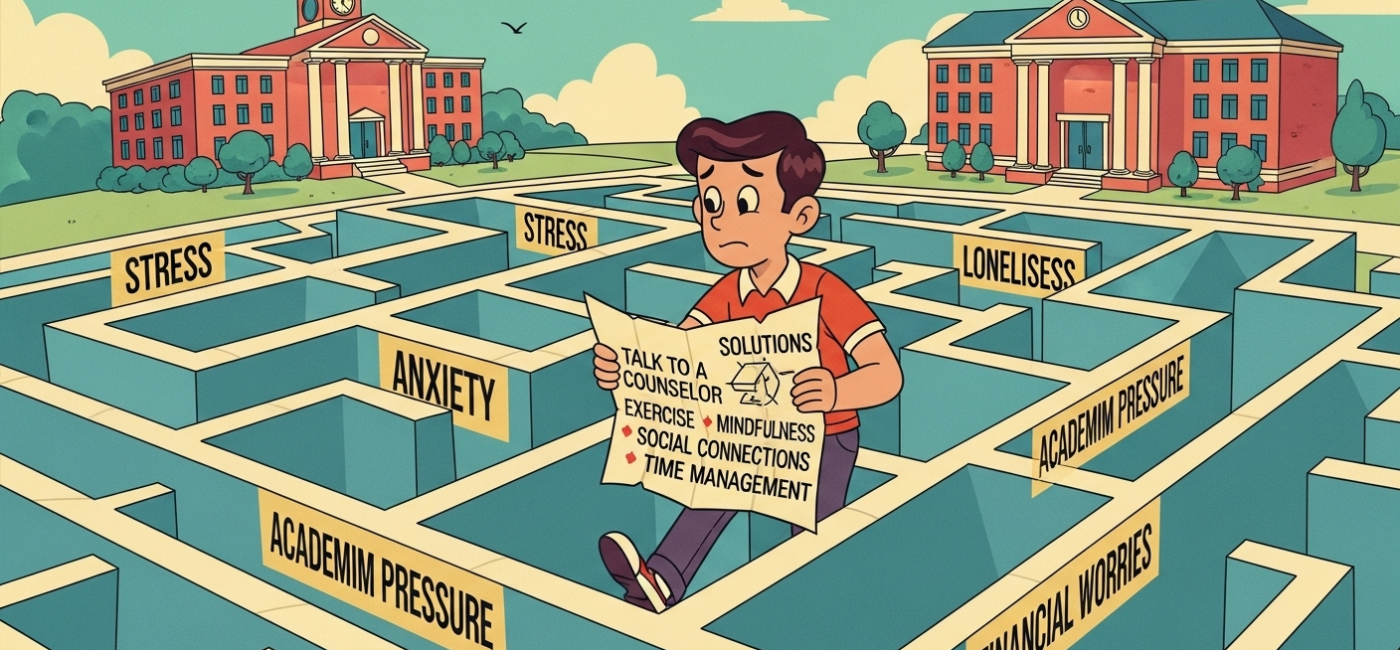College life is often pictured as a whirlwind of new friendships, late-night study sessions, and exciting possibilities. But behind the scenes, many students quietly battle stress, anxiety, and other mental health challenges that can feel overwhelming. From academic pressure to social struggles, the demands on students today are immense—and the impact on their well-being is real.
Common Mental Health Challenges Students Face
It’s not unusual for students to feel anxious about grades, deadlines, or finding their way in a new environment. For example, Sarah, a freshman in her first semester away from home, found herself panicking about her first round of midterms. She barely slept, skipped meals, and began to dread going to class. Like many, she felt alone in her struggle, not realizing that nearly everyone around her had similar worries.
Anxiety isn’t the only hurdle. Take Mike, a sophomore whose parents were counting on him to bring home stellar grades. The constant pressure led to feelings of inadequacy when he scored lower than expected on a major exam. Mike started withdrawing from friends and lost interest in activities he used to love. What began as stress soon morphed into depression, a common but often hidden companion for many students.
Sleep problems are also rampant. Between part-time jobs, group projects, and trying to maintain a social life, students like Priya often survive on just a few hours of sleep. She’d pour endless cups of coffee to stay awake, but the exhaustion made it even harder to focus, leading to a vicious cycle that worsened her mood and her grades.
For some, the pressure leads to unhealthy coping strategies. After a tough semester, friends noticed that Tyler was drinking more at parties and skipping meals to try to keep his energy up. Soon, he realized he was using substances to manage his stress, a pattern that’s all too common among college students.
Implications: More Than Just Bad Grades
The effects of these mental health struggles go well beyond the classroom. Students dealing with ongoing stress or depression often see their grades slip, not because they’re less capable, but because it’s tough to focus or even care when your mind is weighed down. Social lives can suffer too—students might pull away from friends or stop participating in clubs and sports they once enjoyed.
Physical health takes a hit as well. Chronic stress can lead to headaches, frequent colds, and even stomach problems. For students like Priya, lack of sleep and constant worry left her feeling sick more days than not. Mike noticed he was getting more colds and headaches, which only made it harder to keep up.
Left unchecked, these issues can follow students long after graduation, making it harder to land a job or build healthy relationships in the future.
Easiest and Most Relatable Solutions
While the challenges are real, there are simple, practical ways students can take control of their mental health—no therapy couch required.
Making Self-Care a Priority
It might sound cliché, but basics like getting enough sleep, eating regular meals, and moving your body really do make a difference. Sarah started taking short afternoon walks around campus, which helped clear her head and boost her mood. She also set a bedtime alarm—not just a wake-up alarm—to remind herself when to wind down.
Staying Connected
It’s easy to feel isolated, especially at a huge university. Mike joined a campus soccer club, not because he was a star athlete, but because he wanted to meet people. The weekly games gave him something to look forward to and reminded him he wasn’t alone.
Managing Time Without Losing Your Mind
A simple planner or phone app can work wonders for organizing assignments and activities. Priya began breaking big projects into smaller tasks, checking them off as she went. This helped her feel a sense of accomplishment and kept her from feeling buried.
Mindfulness for the Real World
You don’t need to be a yoga master to benefit from mindfulness. Tyler found that taking five minutes in the morning to do some deep breathing—just sitting on his bed, eyes closed, focusing on his breath—helped him start the day feeling calmer.
Using Campus Resources
Most colleges offer free or low-cost counseling. When Mike finally worked up the courage to visit the campus counseling center, he was surprised at how helpful it was just to talk things out. Many schools also offer workshops on managing stress or building study skills.
Limiting Substances—Without Preaching
It can be tempting to reach for alcohol or energy drinks to cope, but moderation really helps. Tyler started alternating alcoholic drinks with water at parties and noticed he felt better the next day—physically and mentally.
Seeking Academic Help Early
If things start to feel unmanageable in class, there’s no shame in asking for help. Priya reached out to her professor during office hours and found that just a little guidance made her workload feel less daunting.
Recognizing the reality of student mental health struggles is the first step. By sharing simple, everyday examples and solutions, the hope is that more students feel empowered to take small steps that add up to big changes—making college not just a place of learning, but a place of real growth and well-being.

